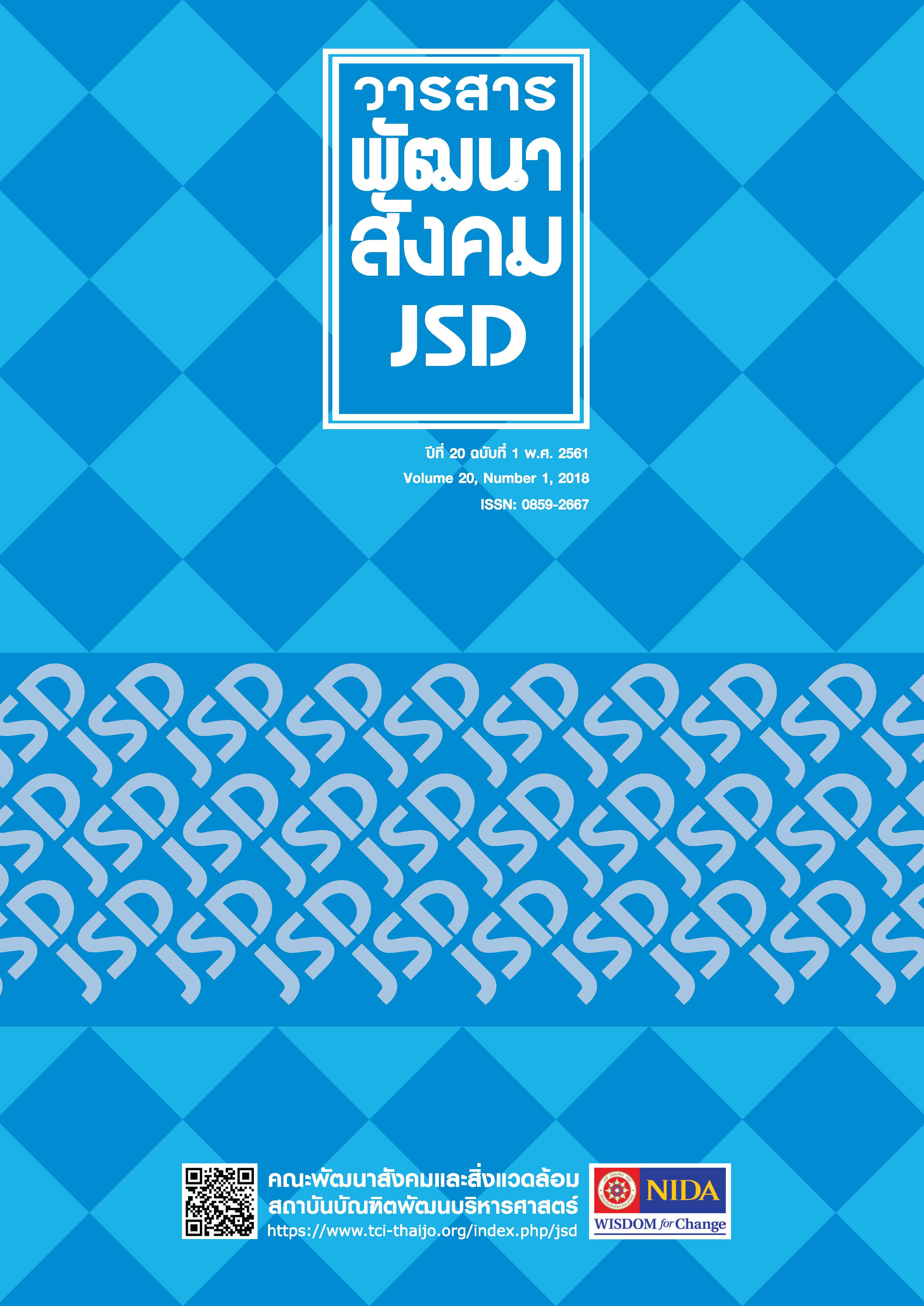Enhancing Governance for Sustainable Development in Local Communities
Main Article Content
Abstract
This paper analyzes the relationships between the principles of governance and the Sufficiency Economy Philosophy and suggests guidelines for enhancing governance toward sustainable development of local communities. The qualitative research method is applied through documentary reviews, focused group discussion, and non-participating observation on community environment, community development, and villagers’ way of living with respect to the principles of governance and the Sufficiency Economy Philosophy. Two chaw sa-ad villages, pilot models for promoting governance selected by the Office of the National Anti-Corruption Commission, namely, Baan Thakhoinang of Sisaket Province and Baan Khulamphan of Prachinburi Province were used for case study. The results indicate that the four pillars of chaw sa-ad under the integrated approach of bovorn or village-temple-and-school connected with the principles of governance and the Sufficiency Economy Philosophy’s salient components of knowledge and integrity are key drivers toward sustainable development of local communities.
Article Details
References
2. Asian Development Bank. (2016). Governance Issues in Asia and the Pacific. Retrieved January 1, 2017 from https://www.adb.org/sectors/governance/issues
3. Bowornwathana, B. (2008). Importing Governance into the Thai Policy: Competing Hybrids and Reform Consequences. In Bidyha Bowornwathana and Clay Wescott (Eds.), Comparative Governance Reform.
4. Bowornwathana, B. (2000). Governance Reform in Thailand: Questionable Assumptions, Uncertain Outcomes. In An International Journal of Policy and Administration.
5. Chayajindawong, C. & Pootrakul, R. (2003). Good Governance and Thai Society [In Thai]. Damrong Rajanuphab Journal, 3(7): 6-11.
6. International Monetary Fund. (1997). Good Governance: The IMF’s Role. Washington, DC: IMF. Kjær, A. M. (2006). Governance. Malden, M.A.: Polity.
7. Kjær, A. M. (2006). Governance. Malden, M.A.: Polity.
8. Macy, J. (1985). Dhama and Development: Religious as Resource in the Savodaya Selfhelp Movement (Revised Edition). West Hartford: Kumarin Press.
9. Mahachulalongkornrajavidyalaya University. (2015). From the Five Precepts Village to Chaw Sa-ad Village [In Thai]. Retrieved December 27, 2016 from http://www.mcu.ac.th/site/articlecontent_desc.php?article_id=2042&articlegroup_id=330
10. Office of the Council of State. (1997). Constitution of the Kingdom of Thailand, B.E. 2540 (1997) [In Thai]. Retrieved January 15, 2017 from http://www.nhrc.or.th/getattachment/7db34ca2-0bc2-4f01-8398-ccaa086f6da9/.aspx
11. Office of the National Economic and Social Development Board. (2006). What is SufficiencyEconomy? [In Thai]. 1
sted. Bangkok: Office of the National Economic and Social Development Board.
12. Office of the National Economic and Social Development Board. (2016). The Twelfth National Economic and Social Development Plan (2017-2021) [In Thai]. Retrieved January 17, 2017 from http://www.ratchakitcha.soc.go.th/DATA/PDF/2559/A/115/1.PDF
13. Office of the Public Sector Development Commission. (2012). The Principles of Good Governance [In Thai]. Retrieved January 5, 2017 from http://www.opdc.go.th/content.php?menu_id=5&content_id=2442
14. Pathranarakul, P. (2005). Governance and Modern Management [In Thai]. Paper presented on the 50th Anniversary of the Graduate School of Public Administration, National Institution of Development Administration, Bangkok, pp. 208-226.
15. Pierre, J. (2010). Conclusions: The Future of Public Management. In Jon Pierre and Patricia W. Ingraham, (eds.), Comparative Administrative Change and Reform: Lessons Learned.2010.
16. Royal Thai Government Gazette. (1999). Office of the Prime Minister’s Regulation on Good Governance B.E. 2542 [In Thai]. Retrieved January 5, 2017 from http://www.dmr.go.th/download/10.pdf
17. Royal Thai Government Gazette. (2003). The Royal Decree on Good Governance B.E. 2546 [In Thai]. Retrieved January 5, 2017 from http://www.sac.or.th/th/wp-content/uploads/2016/04/good-governance-2546.pdf
18. Sittkumjon, K. S. (2008). The Practice of Good Governance in Private Higher Education Institutes [In Thai]. Doctoral Dissertation, Silpakorn University.
19. Suwanmongkol, P. (2015). Public Administration and Good Governance [In Thai]. Retrieved January 3, 2017 from http://kpi.ac.th/media/pdf/M9_127.pdf
20. United Nations. (2016). Sustainable Development Goals. Retrieved December 26, 2016 from https://sustainabledevelopment.un.org/?menu=1300
21. United Nations in Thailand. (2016a). The Global Goals for Sustainable Development [In Thai]. Retrieved December 27, 2016 from http://www.un.or.th/globalgoals/th/the-goals/
22. United Nations in Thailand. (2016b). UN Priorities [In Thai]. Retrieved December 28, 2016 from http://www.un.or.th/th/%E0%B8%87%E0%B8%B2%E0%B8%99%E0%B8%AB%E0%B8
%A5%E0%B8%B1%E0%B8%81/
23. United Nations Economic and Social Commission for Asia and the Pacific. (2009). What is Good Governance?. Retrieved December 31, 2016 from http://www.unescap.org/resources/what-good-governance
24. World Bank (1989). Sub-Saharan Africa: From Crisis to Sustainable Growth.Washington DC: World Bank.
25. World Commission on Environment and Development. (1987). Our Common Future. World Commission on Environment and Development. Oxford University Press, Oxford.

